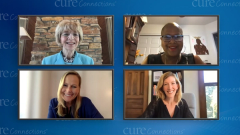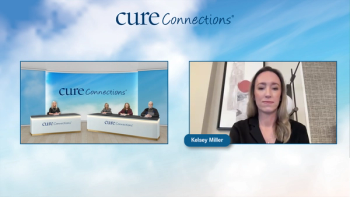
Self-Inventory for Metastatic Breast Cancer
Julie Larson, LCSW, discusses the concept of self-inventory and questions patients may ask themselves to evaluate their health.
Episodes in this series

These are the experiences and opinions of panelists, not physicians.
Shirley A. Mertz, MA, JD: Julie, do you have some issues you think are important if we're talking about a self-inventory of what we should or shouldn't do when we have cancer that might hurt us further in our situation, or help us?
Julie Larson, LCSW: How long do you have?
Shirley A. Mertz, MA, JD: Well, a few minutes here. Sure, go ahead.
Julie Larson, LCSW: Yeah of course. You know I think that most of my work with people begins with self-awareness. I would say what I want people to begin with and if, when they walk through my door and they're feeling distress is I often say, I give my clients homework. And I say, can we begin to cultivate a habit, and I would say that to the audience today, can you begin to cultivate a habit of checking in on yourself? How am I doing here? How am I doing? You know, what's happening? Am I feeling really irritable, am I feeling impatient, am I feeling unmotivated, am I feeling sad, am I feeling a deep sense of gratitude? How am I doing? And along with that question, what am I doing that's either working for me- taking my walk in the morning, getting to bed on time, filling up my water bottle, connecting with friends, putting on music- what am I doing that's working for me and what am I doing that may not be working for me? Giving loss to my social media, fortune telling, making assumptions, catastrophizing. So I think that that self-awareness, and that's a lot of what I continue to work with my clients as we think about self-care, is let's look at yourself. What's happening for you? Where does your stress show up? Does your stress show up in that pit in your stomach? Does is show up because you feel that hamster wheel of thoughts spinning in your head? Does it show up because you're really suddenly very fragile and teary? What do you know about yourself?
Shirley A. Mertz, MA, JD: I think there are a couple things though that I know I've been asked when I've met with doctors, and they will ask, well do you smoke? And or, do you drink alcohol regularly? I think that those are two things that we need to consider if we are doing them before our diagnosis that we might check in with our doctor about, to what extent should we do that. Since my metastatic disease went throughout my skeleton, one of the things that I was advised was to take, be sure I had sufficient calcium and vitamin D3, which supposedly are helpful to strengthening the bones.
Lisa Laudico: And biotin, and biotin. I think biotin's also good.
Shirley A. Mertz, MA, JD: So again, I urge the listeners to this presentation to always check with your doctor. But I think the, what we're trying to get at here is there are things that you can undergo, or you can feel physically that can have an impact on comorbidities that you might not have. For example, I don't sleep well, and I've been told that because my sleep is fractured- I wake up and then I have trouble sleeping- that that also can impact my heart. And whether it grow, the parts of the heart become stiff. I've had to deal with how to I come to grips with sleeping through the night and I did see a social worker about that. I think that is another example of how the physical can impact the body and that is just another way that if we can keep our body healthy, we maybe can go through treatments a lot easier. Because some of our treatments, as we know, may produce side effects of diarrhea or nausea, and those are all other things that can impact it. Julia, what did you think of Sheila's idea, I have the disease so why not just enjoy myself? Go ahead.
Julie Larson, LCSW: I don't know if you noticed, but a part of me was like, that's self-care. Because there's something about having pizza with friends, to make pizza- even a beer. With friends, that's an important part of your well-being, right? It's connection, it's to include, it's feeding your soul in a certain way. I think so much of self-care, pretty much everything I talk about with self-care, is a balance. We've got to begin to figure out where does that pendulum fall and what is the indicator that I've got to swing the other way? Whether that's your diet and exercise, whether that's a feeling of wanting to be alone versus needing to connect, whether that's giving yourself self-compassion and cutting yourself a break and maybe kicking yourself in the pants and putting in some discipline. Everything is a balance, so we can't swing one way or the other.
This transcript has been edited for clarity.




